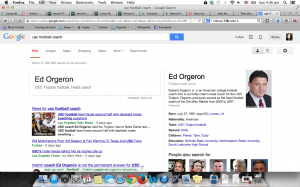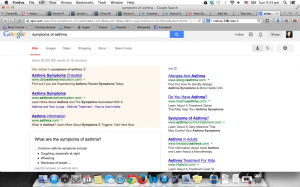It has become a natural routine for people to google on questions and information. Just by typing a few words, Google could deliver search results by matching webpages that have keywords similar to what I typed. However, we still have to go through the search results to find the most relevant information. Lately, Google has updated its search algorithm again. The new Hummingbird algorithm was launched in late September and it provides search results that relates to the contextual meaning of the typed words and phrases. Originally, people would see googling as a question and answer sort of search but this update has made the search more human sensitive and more similar to a conversation.
What this means is that if I search for “USC football coach”, it would pop up a full complete profile of the current USC Football team coach, Ed Orgeron. Originally, the old search might only link you to USC football related webpages with the search words but now the semantic search will give you a overall profile of the person and may even list contacts or Linkedin pages of the relevant person.
Another example is that if I type “the symptoms of asthma,” Google would have indexed an answer from nih.gov and displayed the answer directly in the search results.
Obviously, this is a great improvement but how will it affect content marketers?
Our content might be filtered out easily. First, there are author rankings, if you have no reputation online, you’re simply a nobody or anonymous online, your content will not appear on the top results. Other than that, if your content has not been optimized properly with meta tags, Google will also filter out your results. Even if you have completed meta tags and descriptions, if you use the same topics for all your contents, it will be defined as less influential and eventually filtered out in the Google search too.
Thus, in order to successfully market your content, if is important to first publish on sites with reputation and authority as well as to have proper and distinctive meta tags and topics.
Sources:
http://www.marketingprofs.com/articles/2013/11833/should-you-be-worried-about-googles-hummingbird-update
http://www.marketingprofs.com/articles/2013/11834/what-google-hummingbird-means-for-content-marketing




2 Responses to Google’s race for relevance: How does it affect content marketers?